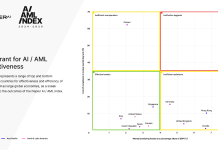As 2024 progresses, regulators worldwide find themselves increasingly busy, grappling with the dual challenges of an ever-changing geopolitical landscape and the rapid evolution of technology. The impact on financial crime regulation is profound, necessitating many new measures and adaptations to keep pace with these dynamic conditions.
In a recent post by Encompass Corporation, the firm outlined some of the regulatory challenges that are occurring in shifting geopolitical landscapes and tech innovations.
The upcoming global election cycles will compel regulators to continuously monitor and adapt their strategies to meet both political and public demands. For instance, major elections are underway in India, and Taiwan has recently elected a new President and Parliament.
Additionally, the UK called for national elections in July, with the USA following in November. Each jurisdiction’s approach to these pressures varies, and electoral outcomes in one region can influence regulatory responses in another. However, financial criminals are poised to exploit these political uncertainties, targeting cross-jurisdictional loopholes, regardless of the outcomes.
EU regulators have taken significant steps by finalising the largest package of anti-money laundering (AML) regulations to date. In January 2024, agreements were reached on three separate packages, including the AML Regulations (AMLR), AML Directive (AMLD), and the establishment of the AML Authority (AMLA).
These measures aim to harmonise AML rules across the bloc. Frankfurt has been chosen as the new location for the AMLA, which will have cross-jurisdictional enforcement authority over larger EU-based financial institutions, facilitating information exchange and direct supervision.
In the USA, the Corporate Transparency Act of 2021 (CTA) continues to advance, with the development of a federal register of beneficial ownership now accepting new company reports as of January 2024.
The CTA focuses on curbing illicit finance by requiring businesses to report information about their ultimate owners. Despite the establishment of a framework for gathering and protecting beneficial ownership information in December 2023, the CTA faces continued discussion and pushback from various stakeholders. The US elections will significantly impact the future direction of this register.
The EU experienced a major regulatory shift in 2023 when the EU Courts of Justice declared public beneficial ownership registers invalid, citing incompatibility with fundamental rights to privacy and data protection. This ruling led to the shutdown of beneficial ownership registers across EU member countries.
However, regulatory and public pressure has led to a gradual reopening of these registers in 2024. New regulations under the AMLD will allow investigative journalists, NGOs, and other parties with a legitimate interest to access beneficial ownership details, with full requirements set to take effect by mid-2026.
In the UK, Brexit has prompted the passage of the Economic Crime and Corporate Transparency Act of 2023. This bill enhances supervisory and enforcement powers for relevant UK authorities, including Companies House, which manages the UK’s beneficial ownership register and corporate databases. The goal is to boost financial market transparency and enforcement. However, the level of funding for these initiatives may be influenced by upcoming elections.
Globally, upcoming election cycles will provide insight into public sentiment regarding how their respective governments should address financial crime, particularly money laundering. There continues to be growing awareness of the need to identify beneficial ownership given the Russian invasion of Ukraine.
The unprecedented coordination of multiple jurisdictions in establishing new sanctions regimes against oligarchs and other entities directly financing the war has been a real focus. However, public sentiment may change given the length of the conflict and the financial costs of support.
The advent of generative AI (Artificial Intelligence) technology has been a significant event. Tools like ChatGPT, Gemini, and other large language models offer both benefits and risks. Regulators are closely monitoring the implications of these AI technologies, which are still relatively new. Although various jurisdictions have introduced AI regulations, the scope and governance requirements vary widely.
Current AML regulations provide clarity on processes for detecting financial crimes, but the novelty of generative AI means that additional regulations might be premature and could have unintended consequences. The financial services industry is still exploring the capabilities and limitations of these tools, with new regulations expected soon.
As 2024 unfolds, regulators and financial crime regulations will face significant changes driven by geopolitical shifts and technological advancements. Global elections will necessitate regulatory adaptations to balance transparency, privacy, and innovation. The emergence of AI technology adds further complexity to this landscape. Regulators must remain adaptable and vigilant, navigating these challenges to effectively combat financial crime and ensure a stable and secure financial system.
Keep up with all the latest FinTech news here
Copyright © 2024 FinTech Global











